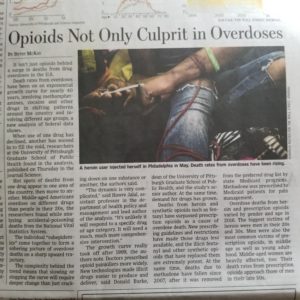“That’s what happens when hope dies. People die. Or go mad. Or get on drugs.” Tom Hanson in American Junkie
Huey Lewis famously sang about craving a new drug back in good old 1983. He said he wanted something that didn’t come in a pill, or make him sick or feel nervous or make his eyes too red. I could champion the song–after all, the new drug is love–except that it’s the kind of love that is completely self-serving. The new drug is “one that makes me feel like I feel when I’m with you.” In other words, Huey Lewis is still chasing intoxication, just a kind that is more socially acceptable.
 I thought of that song after I read an article in the Wall Street Journal on Friday that pointed out opioids are not the only drug people die from. Researchers that study these things closely pointed out, “The complexity behind the trend means that slowing or stopping the curve will require deeper change than just cracking down on one substance or another.” While the White House has made opioid addiction one of the top focuses of its agenda, throwing millions of dollars at states in an effort to curb drug abuse, I learned my home state will receive $29 million to fight drug addiction. When I see a figure like that, I am humbled. Still, it is clear we are not making headway. No one has the solution, though many are trying to find one.
I thought of that song after I read an article in the Wall Street Journal on Friday that pointed out opioids are not the only drug people die from. Researchers that study these things closely pointed out, “The complexity behind the trend means that slowing or stopping the curve will require deeper change than just cracking down on one substance or another.” While the White House has made opioid addiction one of the top focuses of its agenda, throwing millions of dollars at states in an effort to curb drug abuse, I learned my home state will receive $29 million to fight drug addiction. When I see a figure like that, I am humbled. Still, it is clear we are not making headway. No one has the solution, though many are trying to find one.
One such man, Michael Kuhar, writes in his book, “The Addicted Brain: Why We Abuse Drugs, Alcohol and Nicotine,” that “Drugs, the brain, and addiction create this dreamland of fantasy.” Yes, part of the problem is that people desire a fantasy but they also turn to drugs because of depression, pain (physical and psychological) and stressful situations. He points out that “Drugs couldn’t produce a reward if these capabilities weren’t already in the brain.” Therefore our brains work against us in this regard. Much of his research focusses on finding different kinds of drugs that will neutralize the affect of the bad drugs because, “addiction is a brain disorder, maybe like a migraine headache or a seizure.” His research with animals and humans lead him to believe we are pretty much helpless without pharmaceutical intervention and he seeks to prove that with a series of pictures of brains under the influence.
If, as Dr. Kuhar describes, we are hard-wired to experience pleasure, how do we manage the regulation thereof? It is obviously illogical to spend ones life sitting in a room and pressing a lever that delivers electrical stimulation directly to the pleasure centers of the brain simply because they exist. Life is more than the pursuit of pleasure, but the culture we live in seems bent on convincing us otherwise.
C.S. Lewis highlights the “dryness” we mere mortals experience on our journey and how it can be exploited in Chapter 9 of his work, “The Screwtape Letters.” This fictional discourse between devils Screwtape and Wormwood are insightful. Screwtape writes, “Never forget that when we are dealing with any pleasure in its healthy and normal and satisfying form, we are, in a sense, on the Enemy’s (God’s) ground. I know we have won many a soul through pleasure. All the same, it is His invention, not ours. He made the pleasures: all our research so far has not enabled us to produce one. All we can do is to encourage the humans to take the pleasures which our Enemy has produced, at times, or in ways, or in degrees, which He has forbidden. Hence we always try to work away from the natural condition of any pleasure to that in which it is least natural, least redolent of its Maker, and least pleasurable. An ever increasing craving for an ever diminishing pleasure is the formula. It is more certain; and it’s better style. To get the man’s soul and give him nothing in return–that is what really gladdens Our Father’s heart.”
Thus we are tempted to indulge our physical bodies at the expense of our spiritual selves. Worse, we start to believe the lie that the physical self rules the spiritual and we are in fact helpless, hopeless and completely at the mercy of our cravings. We are so fully ensnared that we make peace with our chains. We are so unwilling to remove them that we parlay with the devil once more rather than face the reality of our situation. We are not simple dabblers, casual connoisseurs or rubes. We are nothing short of slaves and if we do not make war against our captor, we will perish.
I believe this is where the “deeper change” must occur. But we cannot change to something unless we know what we must change from. We must pick up the mirror and look intently at our natural face. We must observe and acknowledge. Then we must take up our sword.
“But I say, walk by the Spirit, and you will not gratify the desires of the flesh.” Galatians 5:16
“For to set the mind on the flesh is death, but to set the mind on the Spirit is life and peace. For the mind that is set on the flesh is hostile to God, for it does not submit to God’s law; indeed, it cannot. Those who are in the flesh cannot please God.” Romans 8:6-8
The first time I took up my sword it was very heavy. I was so accustomed to indulging my desire for sugar and food that saying no took every ounce of strength I had. I agonized beneath the weight of my desires. I squirmed and writhed. I went through withdrawals. I ached with insecurity and anxiety. I tossed to and fro in my bed. I was weak and that is why I cried out to God. I needed more than what I could offer myself. I fought on my knees in prayer and with the Word of God–which I memorized. For the first time in my life I embraced sobriety but I had no lasting comfort that I could sustain it. So I managed one minute at a time, and then one hour, and then one day. I made a choice between my chains and freedom. It is the hardest choice I have ever made in my life and the best.
 Some may read this and say my answer is too simple. “Cry out to God,” she says. “I’ve done that! It didn’t work. You don’t understand. It’s just too hard.” Dear Friend, fear is rational, courage is optional. But remember what John Owen says, “If you are fighting sin, you are alive. Take heart. But if sin holds sway unopposed, you are dead no matter how lively this sin makes you feel.”
Some may read this and say my answer is too simple. “Cry out to God,” she says. “I’ve done that! It didn’t work. You don’t understand. It’s just too hard.” Dear Friend, fear is rational, courage is optional. But remember what John Owen says, “If you are fighting sin, you are alive. Take heart. But if sin holds sway unopposed, you are dead no matter how lively this sin makes you feel.”
America–indeed the world–has a pleasure problem. But we are not without a solution, no matter what the news media says. Jesus Christ came to seek and to save those who are lost. If you are struggling with addiction today, please know that He cares for you. If you will surrender your life to him, indeed the chains that bind you will be broken. Sin and death will no more have dominion over your life. No matter who you are or what you have done, there is no pit so deep that God’s love is not deeper still (Corrie Ten Boom). Then, knowing Him, you can rest in the pure pleasure of his love and grace. I promise, there is no sweeter friend than He who spoke the world into existence.
“Because, if you confess with your mouth that Jesus is Lord and believe in your heart that God raised him from the dead, you will be saved. For everyone who calls on the name of the Lord will be saved.” Romans 10:9 & 13
Leave a Reply